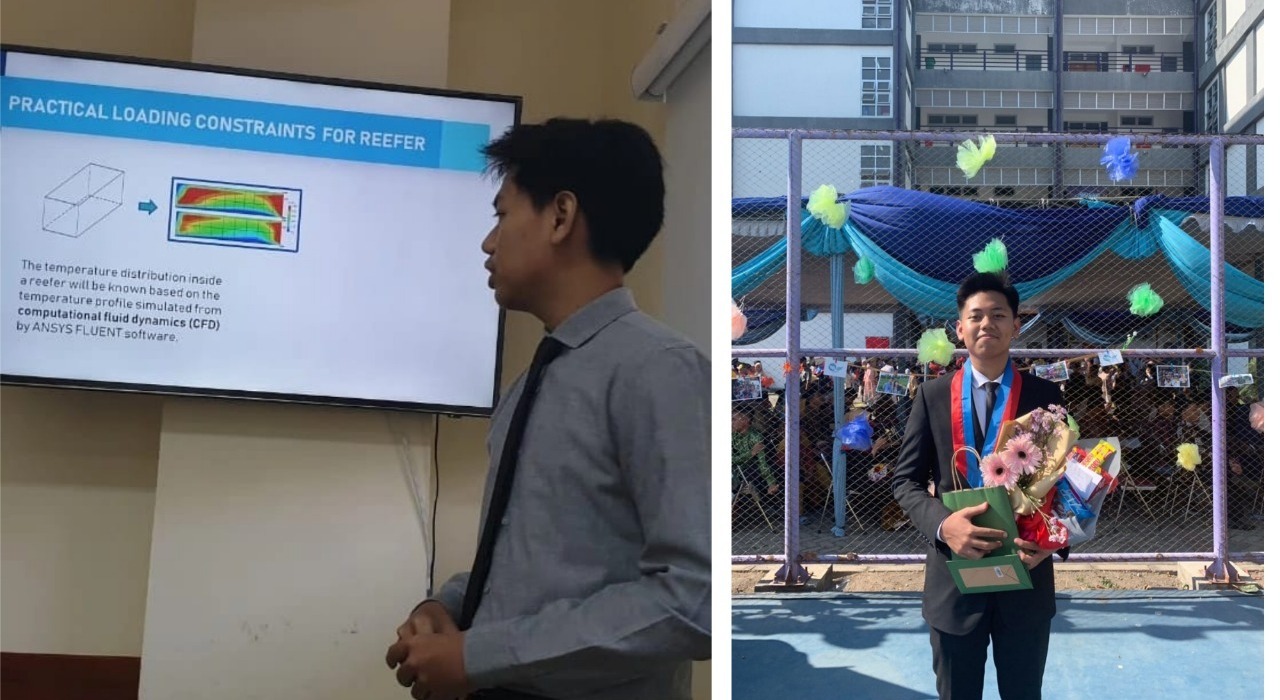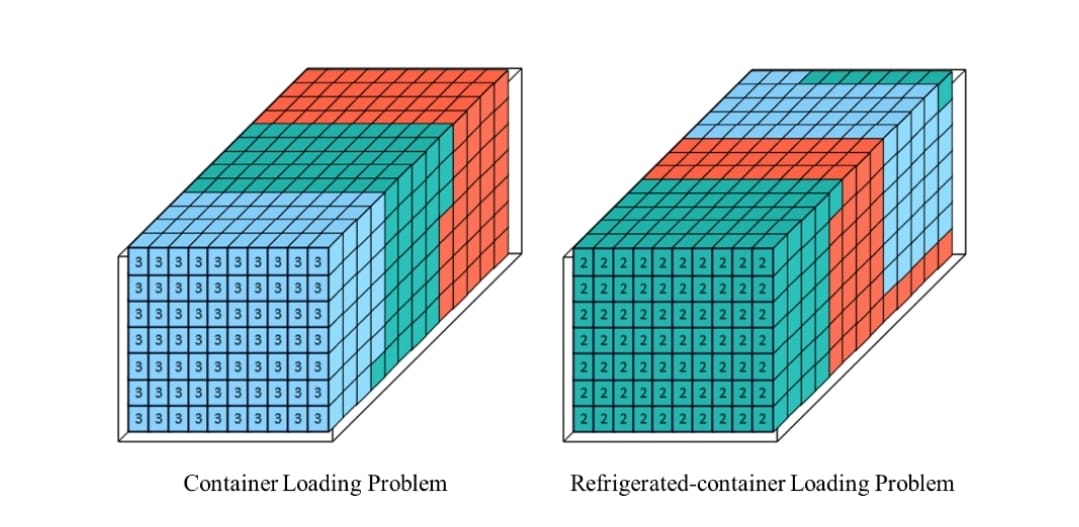ITS Civitas Optimizes Fish Cargo Preparation, Successfully Penetrates Q1 Journal

With research in his Final Project on reefers, Irza Rachmadiar Adetio ST received his bachelor’s degree from the Department of System and Industrial Engineering ITS.
ITS Campus, ITS News –Maintaining the quality of fish commodity products while in refrigerated containers is a challenge for alumni of the System and Industrial Engineering Department, Institut Teknologi Sepuluh Nopember (ITS). This problem is stated in his Final Project with the topic of optimizing the arrangement of fish cargo loading based on the temperature distribution in refrigerated containers. This final project upgrade was also successfully published in an international journal in the Q1 category
Dr. Ahmad Rusdiansyah CSCP CLTD IPU as the counselor lecturer, said that this started when he gave ideas and research challenges to his student, Irza Rachmadiar Adetio, an undergraduate student at the Department of System and Industrial Engineering ITS batch 2015 who had successfully graduated in 2019.
The challenge is to optimize the arrangement of loading frozen fish cargo in refrigerated containers or the Refrigerated-Container Loading Problem (R-CLP). “This research was inspired when we encountered real problems in the fish processing industry and the people’s fish port in Brondong, Lamongan,” said Doddy, his nickname.
The Vice-Rector III of ITS continued, the TA, completed in 2019, discussed the development of the R-CLP model that utilizes information on room temperature and the ideal temperature of various types of fish. Regarding the logistics of perishable or perishable commodities, this TA focuses on optimizing fish logistics. “This TA research topic is part of an umbrella research related to transportation in cold chain systems,” he explained.
The lecturer of the Transportation and Distribution System Modeling course explained that because of the specific temperature requirements, placing the fish at an ideal temperature and freezing will keep the quality of the fish up to the recipient’s hands. “Because temperatures that are too low or too high greatly affect the quality of fish, this placement is adjusted to the needs of fish preservation temperatures,” he explained again.
Doddy added that using the Computational Fluid Dynamics (CFD) simulation, information about the temperature at specific points for the appropriate placement of fish cargo will be obtained. The data is then integrated with several factors such as cooling temperature, airflow, and fish temperature requirements to become a software prototype.
Furthermore, the models and algorithms that have been obtained previously are then transformed into a software prototype called REFLOAD. This software can determine the cargo arrangement of each type of fish that is adjusted to the needs of the fish and the temperature at points in the cargo. “What’s interesting about this software is the utilization of the optimization and visual capabilities of spreadsheets which have been widely used for offices,” said the ITS Industrial and Systems Engineering Department lecturer.

Display of REFLOAD software output (right) for optimizing the arrangement of refrigerated-container (reefer) according to the ideal temperature requirement of each fish commodity
Doctoral graduate from Tokyo Institute of Technology This reveals that with the heuristic algorithm approach, this software can cover various types of fish, cargo box dimensions, and temperature distribution data in the reefer. The use of REFLOAD, can minimize the reduction in product quality while maintaining the optimization of the use of space in the joint.
Seeing the uniqueness of this research, Doddy was inspired to improve the quality of writing and experiments so that they deserve to be published in international journals. With the help of Ratna Sari Dewi ST MT Ph.D., a lecturer from the same department and a student member of the Agrifood Supply Chain research group led by Doddy, this scientific article which is the development of Irza Rachmadiar Adetio’s TA can be accepted for publication in international journals under the category Q1 or 25 percent of the most influential journals in their fields with a Scimago Journal and Country Rank (SJR) of 1.117 in 2020.
The scientific article is entitled The Development of the Refrigerated-Container Loading Problem Model for Perishable Fishery Products Considering Internal Temperature Distribution and was published in the International Journal of Systems Science: Operations and Logistics, published by Taylor and Francis.
Doddy revealed that the process, which took approximately six months, was in line with the Research Upgrading program initiated by the ITS Chancellor. This program aims to encourage lecturers to publish research results with their students. “S1 ITS students have the potential to do research that can be published or patented on the international stage,” he said.
Doddy hopes this research can continue to be developed into commercial software and touch other perishable products. “This opens up opportunities to be developed and continued for other fields such as vegetables and fruits or to improve REFLOAD into ready-to-use software in the cold supply chain industry,” he said. (ITS Public Relation)
Reporter: Ricardo Hokky Wibisono
Related News
-
ITS Rises to Second Rank in Most National PKM Funding
ITS Campus, ITS News – Strengthening its determination in the scientific field, the Institut Teknologi Sepuluh Nopember (ITS) succeeded
April 05, 2022 17:04 -
Examining Kenny, the Best ITS Bachelor Graduate with a GPA of 3.94
ITS Campus, ITS News — Educating for 3.5 years at the Institut Teknologi Sepuluh Nopember (ITS) did not prevent Benedictus
April 05, 2022 17:04 -
Inspirational, Deaf ITS Graduates Graduated with Cumlaude Predicate
ITS Campus, ITS News — An inspiring story was also present at the 129th Graduation Ceremony of the Institut Teknologi
April 05, 2022 17:04 -
129th Graduation: ITS Graduates 1,355 Candidate Leaders
ITS Campus, ITS News – Institut Teknologi Sepuluh Nopember (ITS) again held a graduation procession for its students through the
April 05, 2022 17:04
